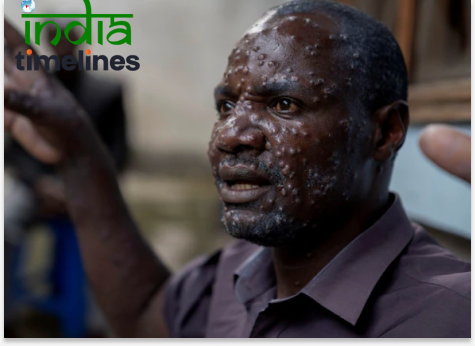
The Mpox virus, a deadly and highly contagious pathogen, is rapidly spreading across several African countries, sparking international concern. As cases continue to rise, the World Health Organization (WHO) is closely monitoring the situation and may soon declare a global emergency. This article explores the nature of the Mpox virus, its impact on affected regions, and the potential global implications of this alarming outbreak.
What is the Mpox Virus?
Origins and Transmission
The Mpox virus, related to the more commonly known smallpox virus, has its origins in zoonotic transmission, typically from animals to humans. The virus can spread through direct contact with infected animals or humans, as well as through contaminated materials. In human populations, close contact, including bodily fluids, respiratory droplets, and skin lesions, can facilitate transmission.
Symptoms and Severity
Mpox virus infection presents with symptoms similar to smallpox, including fever, severe headache, muscle aches, and a characteristic rash that develops into fluid-filled lesions. While the mortality rate varies depending on the virus strain and healthcare access, it can be particularly deadly in regions with limited medical infrastructure. Severe cases can lead to complications such as pneumonia, sepsis, and encephalitis.
Current Spread in African Countries
The outbreak has rapidly spread across multiple African countries, with the highest concentration of cases reported in Central and West Africa. Countries such as Nigeria, the Democratic Republic of Congo, and Cameroon are among the hardest hit. The virus’s spread has been exacerbated by factors like inadequate healthcare systems, lack of public awareness, and limited access to vaccines and treatments.
Impact on Affected Countries
Health Infrastructure Strain
The Mpox outbreak is placing enormous strain on the already fragile health infrastructures in many affected countries. Hospitals are overwhelmed with patients, and there is a severe shortage of medical supplies, including personal protective equipment (PPE), antiviral drugs, and diagnostic tools. This strain is leading to increased mortality rates and the rapid spread of the virus in vulnerable communities.
Economic Consequences
Beyond the immediate health crisis, the Mpox outbreak is having significant economic repercussions. Travel restrictions, quarantine measures, and reduced workforce availability are disrupting local economies. In countries where agriculture and trade are critical, the outbreak is causing food shortages and economic instability, further exacerbating the humanitarian crisis.
Social and Cultural Impacts
The outbreak is also having profound social and cultural impacts. Fear and misinformation are spreading alongside the virus, leading to stigmatization of affected individuals and communities. Cultural practices, such as traditional healing and communal gatherings, are being disrupted as governments impose strict public health measures to contain the virus.
Global Response to the Mpox Outbreak
WHO’s Role and Response
The World Health Organization is at the forefront of the global response to the Mpox outbreak. The WHO is coordinating efforts to provide medical supplies, support healthcare workers, and disseminate accurate information about the virus. The organization is also working with international partners to monitor the outbreak’s progression and assess the need for a global emergency declaration.
International Aid and Support
Several countries and international organizations have pledged aid to help contain the Mpox outbreak. This aid includes financial support, medical supplies, and technical expertise to strengthen the response in affected regions. However, the scale of the outbreak is such that more significant and coordinated international efforts are needed to prevent a global health crisis.
Measures to Contain the Spread
To contain the spread of the Mpox virus, affected countries are implementing various public health measures. These include mass vaccination campaigns, public awareness initiatives, and travel restrictions. Quarantine and isolation protocols are also in place for those who have been exposed to the virus. These measures, while necessary, are challenging to enforce in regions with limited resources.
The Likelihood of a Global Emergency Declaration
Criteria for Declaring a Global Emergency
The WHO uses specific criteria to determine whether an outbreak constitutes a Public Health Emergency of International Concern (PHEIC). These criteria include the severity of the outbreak, its spread across borders, and the potential for a global impact. Given the current trajectory of the Mpox outbreak, there is a strong likelihood that the WHO will declare a global emergency.
Implications of a Global Emergency
If the WHO declares the Mpox outbreak a global emergency, it would trigger a coordinated international response, including increased funding, accelerated research into treatments and vaccines, and stricter travel and trade restrictions. Such a declaration also raises awareness and mobilizes resources on a global scale, which is crucial for controlling the outbreak.
Previous Global Emergencies and Lessons Learned
The declaration of a global emergency is not unprecedented. Past examples include the Ebola outbreak in West Africa and the COVID-19 pandemic. These events have shown the importance of early detection, swift response, and international cooperation. The lessons learned from these crises could help mitigate the impact of the Mpox outbreak if a global emergency is declared.
Prevention and Control Measures
Vaccination and Treatment Options
Vaccination is one of the most effective ways to prevent the spread of the Mpox virus. While there is no specific vaccine for Mpox, the smallpox vaccine has been shown to provide some protection. Additionally, antiviral drugs are being used to treat those infected, although access to these treatments is limited in many affected areas.
Public Health Guidelines and Awareness Campaigns
Public health guidelines are being implemented to reduce the spread of Mpox. These include promoting hand hygiene, safe food practices, and avoiding contact with infected individuals. Awareness campaigns are also being launched to educate the public about the virus, its symptoms, and how to protect themselves and their communities.
Travel Restrictions and Quarantine Measures
To prevent the international spread of Mpox, many countries are imposing travel restrictions and quarantine measures. Travelers from affected regions are being screened, and those showing symptoms are required to undergo quarantine. These measures, while disruptive, are essential for preventing the virus from spreading to new areas.
The Future of the Mpox Outbreak
Potential Scenarios and Outcomes
The future of the Mpox outbreak remains uncertain. If containment measures are successful and international support is scaled up, the outbreak could be brought under control. However, if the virus continues to spread unchecked, it could lead to a prolonged global health crisis with severe consequences for affected regions and beyond.
Long-Term Implications for Public Health
The Mpox outbreak is likely to have long-term implications for public health, particularly in affected countries. Strengthening healthcare systems, improving disease surveillance, and investing in vaccine research are crucial steps that must be taken to prevent future outbreaks of Mpox and other emerging diseases.
Importance of Global Cooperation
Global cooperation is essential for controlling the Mpox outbreak. This includes sharing information, resources, and expertise across borders. By working together, countries can better prepare for and respond to the challenges posed by the Mpox virus, ultimately preventing it from becoming a full-blown global emergency.
Conclusion
The Mpox virus is spreading rapidly across African countries, raising the alarm for a potential global health emergency. With the WHO closely monitoring the situation, it is crucial for the international community to remain vigilant and prepared. Strengthening healthcare systems, implementing prevention measures, and fostering global cooperation are key to controlling this outbreak and preventing further devastation.
FAQs
What is the mortality rate of the Mpox virus?
The mortality rate of the Mpox virus varies depending on the strain and the quality of healthcare available. It can range from less than 1% to as high as 10% in severe cases.
How does the Mpox virus spread between humans?
The Mpox virus spreads between humans through direct contact with bodily fluids, respiratory droplets, and contaminated objects. It can also be transmitted from animals to humans.
What are the most affected countries in Africa?
Countries most affected by the current Mpox outbreak include Nigeria, the Democratic Republic of Congo, and Cameroon.
Can Mpox be prevented through vaccination?
Yes, the smallpox vaccine has been shown to offer some protection against Mpox. However, access to vaccines is limited in many of the affected regions.
What should travelers know about the Mpox outbreak?
Travelers should be aware of the affected regions, adhere to public health guidelines, and consider postponing non-essential travel to areas with high transmission rates.


































Ledger Live